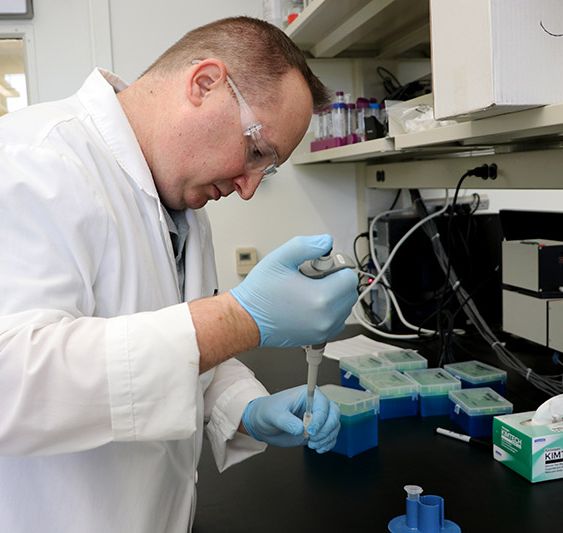When Eric Krueger applied for an individual postdoctoral fellowship from the National Institutes of Health in 2017, the success rate was about 28 percent. And when he got the award—which ends on September 15—he became Lehigh University’s first NIH National Research Service Award Fellow.
“It’s really been fantastic,” says Krueger, a postdoctoral fellow in chemical and biomolecular engineering. “It has allowed me to customize what I want to do, and what I want to learn.”
Over the past two years, the fellowship has supported Krueger’s research examining how to keep bacteria from killing cells without using antibiotics. Specifically, he’s looking at how toxins produced by bacteria in the mouth interact with receptors on white blood cells. The potential applications go far beyond wiping out periodontitis-causing bad guys.
“This could be used for all sorts of other related bacteria,” says Krueger. “Whooping cough bacteria secretes a similar toxin, so do E. coli and the bacteria that causes cholera. We’re trying to set the stage to investigate other bacteria using the methods we’ve been working on with this project.”
Krueger works with Angela Brown, an assistant professor of chemical and biomolecular engineering, who was an NIH NRSA Fellow while a postdoc at the University of Pennsylvania. She says the award reflects Krueger’s singular expertise and work ethic.
“The goal of the NIH postdoctoral fellowship is to support the training of the country’s most promising researchers, specifically those who demonstrate great potential to become future leaders in their fields,” says Brown.
“These awards are extremely competitive and the fact that Eric received one demonstrates his unique creativity, outstanding scientific accomplishments, and commitment to a future scientific career. That we at Lehigh are able to attract such an outstanding postdoctoral researcher demonstrates the strength of the research enterprise here.”
Brown notes that fellowship applicants are required to propose ideas that are related to but distinct from research conducted by principal investigators.
“My lab focuses on using biological mechanisms to design therapeutic strategies, and so the focus is on the design aspect,” she says. “With his training in biophysics, Eric is more interested in the biological mechanism. This fellowship allowed him to focus on areas that are most interesting to him. He proposed and studied his own creative ideas, and his work on these mechanistic aspects of the project were complementary to the design work in the lab and vice versa.”
Those ideas have produced two published papers—the first in ACS Infectious Diseases, and the second in the Journal of Biological Engineering—with a third on the way, all of which Krueger and Brown have co-authored.
Now that the fellowship is nearly over, Krueger is targeting his next move.
“I’m interested in public safety, so I’d like to do infectious disease prevention in the government sector,” he says.
Brown says he will be missed “terribly.” Not only for his scientific contributions but also for all the contributions he made that just can’t be measured.
“Eric developed countless tools and techniques that everyone in the lab uses, and his commitment to scientific rigor impacted us all,” she says. “He helped my graduate students learn how research should be conducted, and he trained three undergraduate researchers, one of whom received a first place award in the Rossin College’s undergraduate research symposium. He has been an invaluable member of my lab.”
—Christine Fennessy is staff writer for the P.C. Rossin College of Engineering and Applied Science


